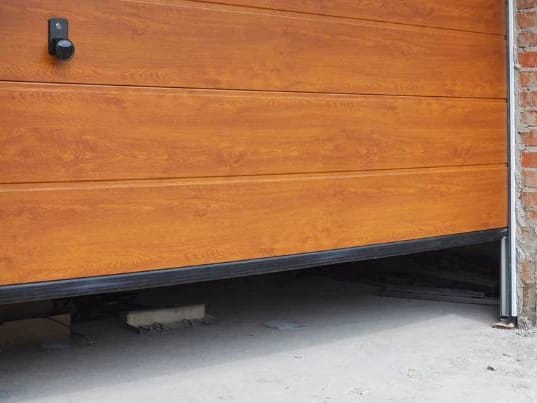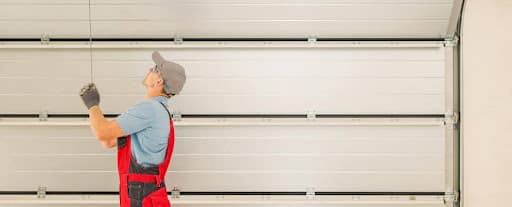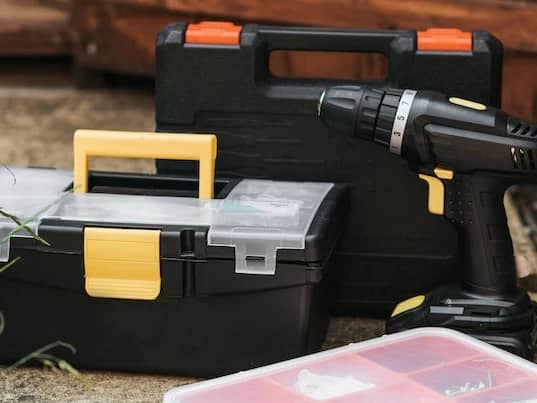You may not think about it too often, but the garage door materials can affect many aspects of your safety and comfort. An old wooden door can be a safety hazard. On the other hand, a modern steel door is a more attractive and safer option.
Before your garage door installation, you must first pick a garage door, and there are several considerations involved. From the color of the garage door to the style, the aesthetic appeal, and durability there are many things to keep in mind before making your decision on the overhead door. One of the most important but overlooked considerations is the climate. Choosing the most durable material (according to the climate in your area) will ensure your garage door lasts for many years to come, even in extreme weather conditions.
Depending on where you live and what kind of weather your area experiences, some materials may work better than others. To help you decide on the best garage door material with respect to the climate, we have created a list of some of the most popular garage door materials for homeowners, along with their pros and cons.
1. Wood Garage Doors: Classic Look for Mild Climates
Garage doors made out of wood have a timeless look that adds natural beauty to any home’s exterior. Because they can be custom-made and because of painted wood they also offer greater design flexibility and curb appeal than other materials. This allows you to incorporate unique color and style features into the natural wood design. Wood is also energy-efficient and soundproof as they provide better insulation than most other materials.

Real wood doors, like cedar doors, can be expensive and need regular maintenance to avoid warping and cracking. Wood is also heavier than other materials, which may pose issues with installation.
But, if maintained with regular waxing and painting, stained wood can last up to several decades without replacement. Having said that, wooden garage doors are usually not suited to areas with high humidity and in most cases, the quality of insulation is also lower than other materials on this list.
Pros:
- They can be customized to any shape, size, and color.
- They are more eco-friendly and add a more earthy charm to any living space.
- They are resistant to dents and can be replaced easily.
Cons:
- They can be challenging to maintain on a busy schedule.
- They need to be water-sealed frequently to prevent water damage.
- They can be expensive if you are not opting for seasoned manufacturers.
2. Steel Garage Doors: Durable Choice for Vancouver Weather
Steel is the most popular material for residential garage doors because it is both affordable and durable. It is an excellent choice for several other reasons too.
Steel garage doors with aligned steel panels provide the strength and modern appeal you need to protect your home from the elements. They are dent-resistant and will not break or crack under pressure.

Steel doors can be insulated with polystyrene or polyurethane foam. Insulated doors are heavier than non-insulated models — making them more difficult for intruders to lift open. Also, proper insulation helps keep your garage at a comfortable temperature year-round.
Even though steel is resistant to rust, to reduce corrosion, you may need to have these overhead doors insulated, sandblasted, and repainted every few years. A topcoat finish will also help prevent rusting. With proper insulation and coatings, steel garage doors can prove to be dependable in almost all sorts of climates.
Pros:
- They are highly durable against harsh weather conditions.
- They are more energy efficient in the long run.
- They are low maintenance that can be managed through routine cleaning and repainting.
Cons:
- They are vulnerable to dents, scratches, and bumps.
- They are not natural insulating materials and might need additional layering for higher performance.
- They are heavy and call for a durable operating mechanism
3. Aluminum Garage Doors: Lightweight and Rust-Resistant
Aluminum garage doors are lightweight and rust-resistant, making them a good choice for coastal areas where salt air can corrode other metals. They come in a wide array of colors and textures and are easy to maintain. However, aluminum doors are not as strong as steel doors, so they may be more prone to dents or dings if hit by debris or hail storms.

Being a more affordable option, aluminum garage doors work best when insulated. The choice between Steel vs aluminum garage doors depends on your personal preference.
Pros:
- They have a sleek and modern look
- They are much lighter in weight, calling for standard operating mechanisms,
- They are tough against weather-related damage.
Cons:
- They are not completely waterproof.
- They can easily sustain dents and scratches.
- They may require insulation to add more to your energy efficiency goals.
4. Vinyl Garage Doors: Low-Maintenance for Coastal Areas
Vinyl is another common material for garage doors because it’s durable, affordable, requires little maintenance, and looks great. Vinyl doors come in a variety of styles and colors to suit any home design aesthetic.
They offer good insulation but may become brittle in cold climates when exposed to sunlight over time. They stand up well in hot climates, but they can warp with exposure to heat over long periods. They resist dents but may crack under pressure. Vinyl also can’t be painted; if you want a different color, you’ll have to replace the entire door.
Pros:
- It is an incredibly cost-effective option.
- It is more convenient to clean and maintain.
- The material is incredibly durable and long-lasting, also making them low on maintenance.
Cons:
- They are low on insulation and will need extra layers to provide adequate protection against elements.
- Once you have opted for a color, it can get challenging to paint over it as the original color will keep showing. You will have to replace the door completely.
5. Fiberglass Garage Doors: Weather-Resistant and Stylish
A fiberglass door combines the durability of steel with an attractive appearance. It’s a great option that has become more popular in recent years because of it being affordable and of course, because of the low maintenance required (it doesn’t rot or corrode). Fiberglass doors are similar to aluminum but are more flexible and provide better insulation against the elements.
However, fiberglass doors are more easily dented than other options on this list and have less strength. They can be damaged by hail or falling tree limbs because they are so flexible.
Pros:
- They are resistant to wrapping or shrinking, making them ideal for extreme conditions.
- They are low maintenance, and regular care is enough to maintain them.
- They allow for natural light to come in, illuminating the space.
Cons:
- Fiberglass is brittle and more vulnerable to damage.
- It tends to develop a yellow tint over time
- The level of insulation fiberglass offers may only be apt for some weather.
How Climate Affects Your Garage Door Material Choice
Extreme Cold Climates and snowfall
If you live in an area that gets cold in the winter (and sometimes snows), you’ll need garage doors that can handle lots of moisture, freezing temperatures, and the impact of snow at high wind speeds. So, it’s best to install a steel or wood garage door. With the right insulation materials, they will also help insulate your garage against heat loss when closed.
The best option is to choose a garage door with two layers of steel and polyurethane insulation that provides maximum thermal energy efficiency with an R-value of 12-16. In extremely cold climates, vinyl or aluminum doors may not hold up under the pressure of snowfall. If you do want vinyl or aluminum doors for their low-maintenance properties, make sure they are insulated.
Heavy rainfall and flooding
If you live in an area where it rains a lot, you’ll want a garage door that won’t rust, warp, or wear down from moisture. Consider a vinyl garage door, which will not suffer from wear and tear in moist environments. Alternatively, you can also choose aluminum, which does not corrode as easily as steel. For coastal areas, a vinyl garage door is one of the most ideal choices.
Even when exposed to salt, sand, and high humidity, a vinyl door will not fade, dent, or break. It also offers a sleek and stylish design on top of these qualities. You can also consider a glass garage door. It boasts an aluminum frame and an R-value of 4-5, making it ideal for damp locations and warmer weather. They also come with wind load reinforcement and are specifically intended for windy coastal locations.
Extreme heat or wildfires
Heavy-duty insulated garage doors are suitable for weathering the hot summer months, high winds, and the occasional tornadoes and severe thunderstorms.
Avoid versions with glass panes if you want an overhead door that will withstand even the worst weather. Even when reinforced with a strong metal frame, glass doors can rupture if they’re exposed to severe winds or hail over an extended period. Classic steel doors or an insulted one is the best material for this weather. Steel garage doors are strong, fire-resistant, and well-insulated.
Quick summary:
High humidity, high heat, and extreme cold are all hard on garage doors. The right material for a garage door will not rot your garage door, warp it or cause it to rust. The key to choosing the most durable, energy-efficient, and low-maintenance option is considering the climate.



